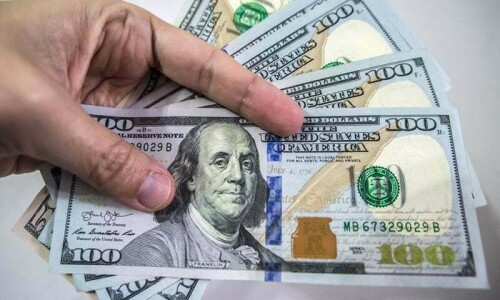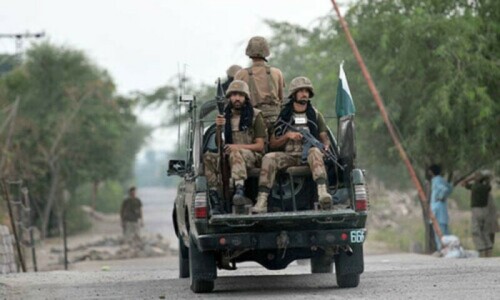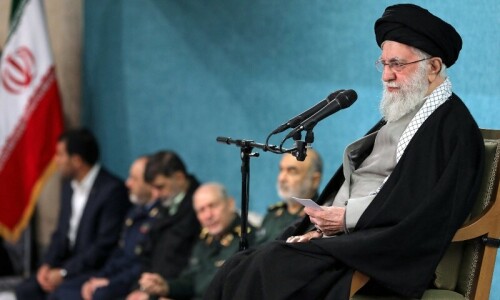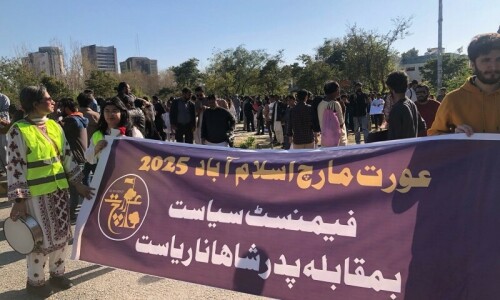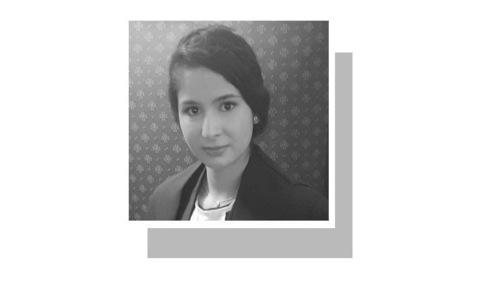
CHARSADDA: Recall Pakistan in the late seventies, the political ferment that defined the era. Recall the political stalwarts that wrestled for influence in national politics while locking horns with anti-democratic forces. It’s likely the faces and histories you recall would be that of men, dominating the parliament and the politics: Mufti Mahmood, Nawabzada Nasrullah, Khan Abdul Wali Khan, Shah Ahmad Noorani, Sardar Sher Baz Mazari and others. And yet, born amidst the tumult of that decade was the political career of a woman from an unlikely place — what was then the Northwest Frontier Province (NWFP) and later to be renamed as Khyber Pakhtunkhwa — who would rub shoulders with the political giants of her time as she battled the most formidable of her male political opponents: Zulfikar Ali Bhutto, the incumbent prime minister of Pakistan
Begum Naseem Wali, who passed away on Sunday, entered politics when Z.A. Bhutto banned the National Awami Party, the major opposition party in 1975. Her husband, Pakhtun nationalist leader Khan Abdul Wali Khan who led the NAP, was incarcerated, and the party declared an anti-state outfit. Cases against party leaders were filed in the Hyderabad Tribunal (1975-1979) — formed by Mr Bhutto to prosecute NAP leaders on charges of treason.
Begum Naseem Wali passes away
With its top tier leadership in jail, the opposition was in crisis. Naseem Wali Khan stepped in to fill the vacuum left by the absence of the NAP, fighting the case against party leaders — that has been widely discredited since as politically motivated. As one of the leaders of the National Democratic Party formed in the NAP’s wake — which joined the combined opposition Pakistan National Alliance, cobbled in the wake of the NAP’s dissolution to run against the Pakistan Peoples Party in the 1977 general elections — she emerged as a major power-broker when she won two National Assembly seats from NWFP.
Begum Wali was the first woman ever to have become a member of the National Assembly in the history of Pakistan. And not a moment too soon: Not only did she lead a movement to have her husband and dozens of his NAP colleagues released from Hyderabad Jail, she also rescued, almost singlehandedly, her family’s political fate and legacy — with roots in Bacha Khan’s Khudai Khidmatgar movement — from oblivion.
It may have been the political storm in the wake of the NAP’s dissolution that catapulted Begum Naseem Wali into national politics, but as someone born and wed into leading political families of Khyber Pakhtunkhwa, she was cut for the political struggle she spearheaded at the time. Daughter of Ameer Mohammad Khan Hoti, an important figure of Khudai Khidmatgar Movement, she married Wali Khan in 1954.
Dispelling the widely-held myth that a woman from a Pakhtun family cannot lead in the public domain, let alone Pakistan’s male-dominated politics at the time, Naseem Wali won two National Assembly seats in 1977. Later, she went on to become parliamentary leader of the Awami National Party (ANP) — founded in 1986. She was elected for four consecutive terms as MPA from Charsadda from the ANP platform, through the four general elections from 1988 to 1997.
“Begum Wali was a political stalwart in the real sense of the word,” said Sardar Mehtab Ahmad Khan, former chief minister under the ANP-PML(N) coalition government in NWFP in 1997. “She had a strong faith in Pakistan and the democratic process. She was a woman of great moral character, an attribute that is hard to retain in practical politics. And yet, she managed to base her politics on principles to the very end.”
Due to internal rifts in the party and differences with ANP leaders, Begum Wali launched her own faction of the ANP in 2014 — the Awami National Party (Wali). Staying politically active through most of the 90s, she eventually reconciled with the rest of the party leadership, merging her faction back into the ANP led by Asfandyar Wali in 2017.
Aftab Ahmad Khan Sherpao, former chief minister of NWFP and a political rival of the Wali family from their political constituency of Charsadda, paid tribute to Begum Wali, praising her forthright politics and struggle. “Her struggle for the strengthening democracy in Pakistan is laudable.”
Begum Wali was buried in Charsadda, next to the last resting place of her husband Khan Abdul Wali Khan. She was mother of the late Sangeen Wali Khan, Gulalai Wali Khan, and of ANP leader Asfandyar Wali Khan.
Published in Dawn, May 17th, 2021

















